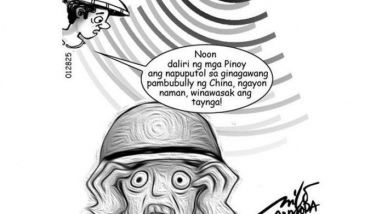Public intellectuals speaking out
August 24, 2004 | 12:00am
Eleven professors from the UP School of Economics have rendered signal public service. Putting their technical skills to good use, they analyze the country’s debt-and-deficit issue in a timely report as a structural problem unmitigated by political partisanship. They also render this vital issue less fudgeable and much more manageable by quantifying many of its critical dimensions and identifying specific policy options and detailed action programs that could arrest the public debt and start reversing the fiscal deficit in the short term. Finally, these courageous professors refuse to blink in clarifying the most likely consequence of continuing neglect – an extremely costly "economic collapse" within the next three to five years.
Economists calling a spade a spade, allowing for no two-, three- or n-handed, now-you-see-it, now-you-don’t readings of an economic concern that confound mostly everyone but the most abstruse initiate of their science? Economists speaking a language that most intelligent laymen could readily understand and may be moved to intelligently act on? What gives?
No, the authors of the report, "The deepening crisis: the real score on deficits and the public debt", are not adjunct professors in some Sierra Madre University. Neither are they closet leftists consorting with those who propose a coalition government involving incorrigible tradpols and intractable radicals.
They are all well-regarded, professional economists, reflecting none of the naivete that theory-bound academics too often suffer in exploring public issues. At least four of them held cabinet positions that brought them into the darkest recesses of political governance. The others have been serious monitors of public policy and their published works merit much attention from their international and local peers, their colleagues in academe as well as in other institutions doing developmental work.
Unlike the nation’s politicians, these economists are demonstrably concerned with serving the long-term interests of their embattled nation. Their report properly concerns itself with data relating to national economic productivity, public finance and official development assistance, but it also does not shun equity issues relating to tax burdens that various sectors of Philippine society must shoulder. Without going overboard on populist policies like "politicized price-setting" , to use the language of the report, the authors nevertheless make it clear that the public interest – the welfare of most Filipinos – must invariably be served. In various parts of the report, whether they are discussing historical backgrounds, illusory schemes or mandatory measures to effectively deal with public debt and fiscal deficits, the authors explicitly articulate their pro-people biases (in marked contrast, one might add, with the merely populist pandering of the politically influential).
The report will undoubtedly merit much public discussion, with specific details concerning the nature of the national debt and deficit crisis as well as the various recommendations for managing it being subjected to intelligent as well as uncritical and/or markedly prejudicial examination. Various sectors of society will naturally respond to the report’s candid assessment of the crisis guided by different interests, some merely in a limited, self-serving way, others hopefully with a more enlightened and comprehensively Filipino perspective.
However, people react to their report, these economists already will have succeeded with their objective: a public airing of the country’s "most urgent problem". With their illuminating report, there is less chance now of the overly facile and extremely costly "resolution" of this particular issue continuing. There are those who the authors decry as giving "a premium to ‘clever’ solutions with a false assurance that there is indeed no crisis, or that a crisis can be staved off with no sacrifice, no pain, and no radical readjustments in people’s way of life." After this report, this pernicious breed will find it so much harder selling their oft-repeated line – a consuelo de bobo for the citizenry they hold in much contempt.
Economists calling a spade a spade, allowing for no two-, three- or n-handed, now-you-see-it, now-you-don’t readings of an economic concern that confound mostly everyone but the most abstruse initiate of their science? Economists speaking a language that most intelligent laymen could readily understand and may be moved to intelligently act on? What gives?
No, the authors of the report, "The deepening crisis: the real score on deficits and the public debt", are not adjunct professors in some Sierra Madre University. Neither are they closet leftists consorting with those who propose a coalition government involving incorrigible tradpols and intractable radicals.
They are all well-regarded, professional economists, reflecting none of the naivete that theory-bound academics too often suffer in exploring public issues. At least four of them held cabinet positions that brought them into the darkest recesses of political governance. The others have been serious monitors of public policy and their published works merit much attention from their international and local peers, their colleagues in academe as well as in other institutions doing developmental work.
Unlike the nation’s politicians, these economists are demonstrably concerned with serving the long-term interests of their embattled nation. Their report properly concerns itself with data relating to national economic productivity, public finance and official development assistance, but it also does not shun equity issues relating to tax burdens that various sectors of Philippine society must shoulder. Without going overboard on populist policies like "politicized price-setting" , to use the language of the report, the authors nevertheless make it clear that the public interest – the welfare of most Filipinos – must invariably be served. In various parts of the report, whether they are discussing historical backgrounds, illusory schemes or mandatory measures to effectively deal with public debt and fiscal deficits, the authors explicitly articulate their pro-people biases (in marked contrast, one might add, with the merely populist pandering of the politically influential).
The report will undoubtedly merit much public discussion, with specific details concerning the nature of the national debt and deficit crisis as well as the various recommendations for managing it being subjected to intelligent as well as uncritical and/or markedly prejudicial examination. Various sectors of society will naturally respond to the report’s candid assessment of the crisis guided by different interests, some merely in a limited, self-serving way, others hopefully with a more enlightened and comprehensively Filipino perspective.
However, people react to their report, these economists already will have succeeded with their objective: a public airing of the country’s "most urgent problem". With their illuminating report, there is less chance now of the overly facile and extremely costly "resolution" of this particular issue continuing. There are those who the authors decry as giving "a premium to ‘clever’ solutions with a false assurance that there is indeed no crisis, or that a crisis can be staved off with no sacrifice, no pain, and no radical readjustments in people’s way of life." After this report, this pernicious breed will find it so much harder selling their oft-repeated line – a consuelo de bobo for the citizenry they hold in much contempt.
BrandSpace Articles
<
>
- Latest
- Trending
Trending
Latest
Latest

By The broader view | By Harry Roque | 1 day ago

By AT GROUND LEVEL | By Satur C. Ocampo | 1 day ago
Recommended

January 28, 2025 - 12:00am


























